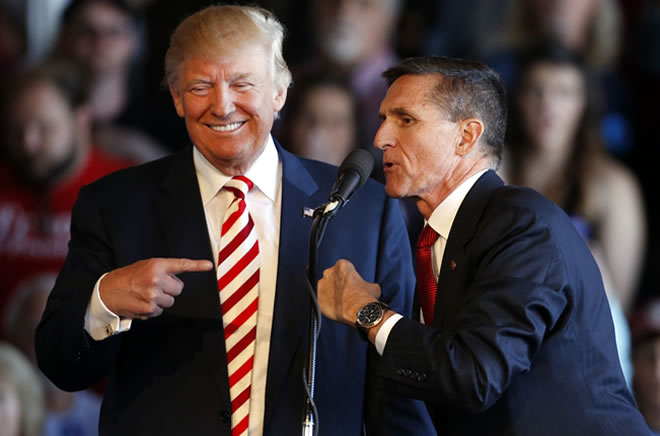
By Jackson Diehl
Deputy Editorial Page Edito
Friday, December 16, 2016

Donald Trump jokes with retired Gen. Michael T. Flynn during an Oct. 18 campaign rally in Grand Junction, Colo. (George Frey/Getty Images)
Donald Trump is about to lead the West into the third and darkest phase of its 15-year quest to neutralize the threat of Islamic extremism. The first was George W. Bush’s freedom initiative, which posited that political liberalization in the Middle East’s rotting autocracies would dry up terrorist recruiting. The second was the engagement policy of Barack Obama, who bet that respectful dialogue and attention to Muslim demands for justice — above all for the Palestinians — would make the West a less compelling target.
Both were widely judged to be failures. Now the new president will embrace the approach that both Bush and Obama explicitly ruled out as morally wrong and practically counterproductive: civilizational conflict.
The outlines of what might well be called the Trump crusade are easily located in the rhetoric of Stephen K. Bannon, Michael T. Flynn, Jeff Sessions and other Trump appointees. They describe a “long history of the Judeo-Christian West struggle against Islam,” as Bannon put it, or “a world war against a messianic mass movement of evil people,” as Flynn, the incoming national security adviser, has written.
Bush and Obama were careful to distinguish the terrorists of al-Qaeda and the Islamic State from Islam itself, which they described as a great religion worthy of respect. Not Flynn. Islam, he has said, is a cancer, a political movement masquerading as a religion and the product of an inferior culture. “I don’t believe that all cultures are morally equivalent, and I think the West, and especially America, is far more civilized, far more ethical and moral,” he argued in a book published this year.
What might this mean in practice? On the battlefields of the Middle East, very little. Trump’s team is certain to continue the ongoing offensives against the Islamic State in Iraq, Syria and Libya. Given that they appear to be slowly succeeding, Flynn and incoming defense secretary James N. Mattis are unlikely to alter Obama’s approach of backing local forces rather than committing large numbers of U.S. troops. The new administration will look for showy ways to challenge Iran, but it is unlikely to do so in the place where it would matter most: Syria.
Trump’s civilizational conflict will be experienced not by Shiite militias or Sunni terrorists — who will surely welcome it — but by average citizens across the Muslim world. They will see it in the “extreme vetting,” if not an outright ban, they will be subjected to in seeking to enter the United States. And they will feel it in the ramping up of U.S. support for dictators and monarchs who are judged by Trump to be tactical allies in the civilizational war
First among these will be Egypt’s Abdel Fatah al-Sissi, who has been lionized by Trump and his aides for supposedly battling jihadists while seeking the “reform” of Islam. In three years of the harshest rule his country has known in at least half a century, Sissi has wrecked the economy and all but destroyed a once-vibrant secular civil society. Yet the increasingly unpopular dictator is quickly emerging as the foremost Trump ally in the region, already invited for the White House visit that Obama denied him.
Other autocratic regimes may quietly fall in behind Trump’s strategy, despite its anti-Islamic cast. Saudi Arabia and other monarchies will welcome heightened U.S. hostility to Iran as well as to the Muslim Brotherhood; Bahrain, the base for the U.S. Fifth Fleet in the Persian Gulf, quickly signaled its obeisance by staging a national day celebration in Trump’s new Pennsylvania Avenue hotel.
Europeans, too, will follow along. Rightist governments in Hungary and Poland are already cheering Trump’s anti-Muslim rhetoric; the more moderate of the two leading candidates to become France’s next president, François Fillon, authored a book titled “Conquering Islamic Totalitarianism.” Even Germany’s Angela Merkel, the most prominent remaining defender of liberal democratic values, felt obliged to strike an anti-Islamic pose last week, proposing a crackdown on the minuscule number of German women who wear a burqa.
It’s not hard to foresee the consequences of this movement. Muslims who despise jihadists and long to modernize their countries with free markets and democratic institutions will be alienated from their potential Western partners. The Islamic State and al-Qaeda, which all along have promoted the idea of civilizational war with the West, will gain new recruits, both in the Middle East and among Western Muslims. Sissi’s regime will eventually crumble from corruption and incompetence, if it avoids a popular rebellion.
Bush and Obama tried to transform the Muslim Middle East, or U.S. relations with it, and failed. Trump’s aim will be to quarantine and repress the region and its religion. The worst foreseeable outcome is that he will succeed.
Jackson Diehl is deputy editorial page editor of The Post. He is an editorial writer specializing in foreign affairs and writes a biweekly column that appears on Mondays. Follow @JacksonDiehl